Wave goodbye to rust and hello to flawless flavors with your Blackstone griddle🍳! With careful maintenance and proper techniques, you can remove rust and make your cookouts legendary. Continue reading to make your rusty griddle the highlight of your backyard barbecues! 🔥👨🍳
Jump to step by step instruction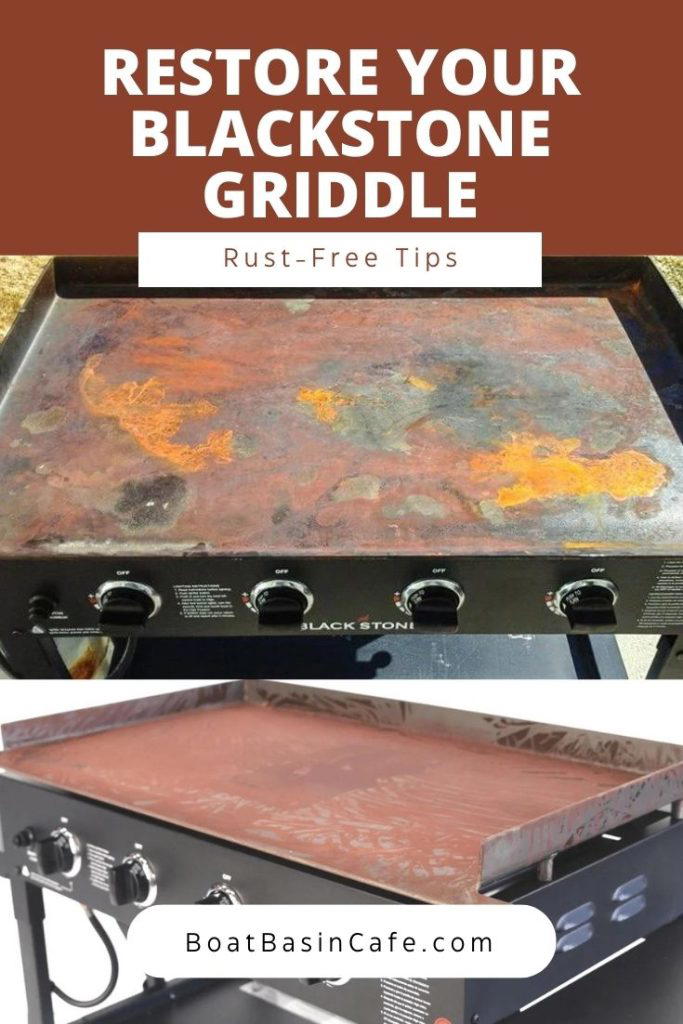
Introduction
Every outdoor enthusiast or home chef should own a Blackstone griddle, an essential tool. Ignoring griddle rust could ruin your cooking experience 🍳.
My mission is to show you how to spot and tackle rust on your griddle. I’ll help you keep this key cooking tool in top shape.
As a former chef, I’ve often dealt with Blackstone griddle rust. I can assure you that managing rust is doable. Think of griddles as good friends that need just a little love, attention, and regular maintenance. Let’s get ready to take care of our griddles and bring them back to perfect condition! 😎
| Signs of Griddle Rust | Solution |
|---|---|
| Noticeable orange or red spots | Clean and scrub the griddle |
| Rough, grainy texture on the griddle | Use a rust eraser |
| Change in food taste or color | Season the griddle again |
Remember these signs and solutions to tackle griddle rust on your Blackstone griddle effectively.
Understanding Rust and Its Effect on Blackstone Griddles
Ever puzzled why even the best griddle surface can develop rust?
Picture this: One sunny Sunday morning, you’re all set to whip up a scrumptious feast on your beloved Blackstone Griddle, only to be greeted by an unsightly rusted patch that materialized overnight.
Suddenly, your once gleaming griddle top, a darling of many barbecues, has turned dull and lackluster. So, what exactly is this rust, how does it form, and why is it an unwelcome guest?
The answer lies in the metal makeup of your griddle. Iron, a key constituent of the metal your griddle is made from, reacts with moisture and oxygen, leading to rust formation 🍁.
But don’t be mistaken; this isn’t just a cosmetic issue. The resultant griddle rust alters the cooking surface, transforming its texture and potentially influencing your food’s flavor.
Besides being a potential taste killer, rust carries health implications as well. Although ingesting a small amount of rust isn’t harmful, consistent food consumption on a rusty griddle surface could pose certain health risks 🏥.
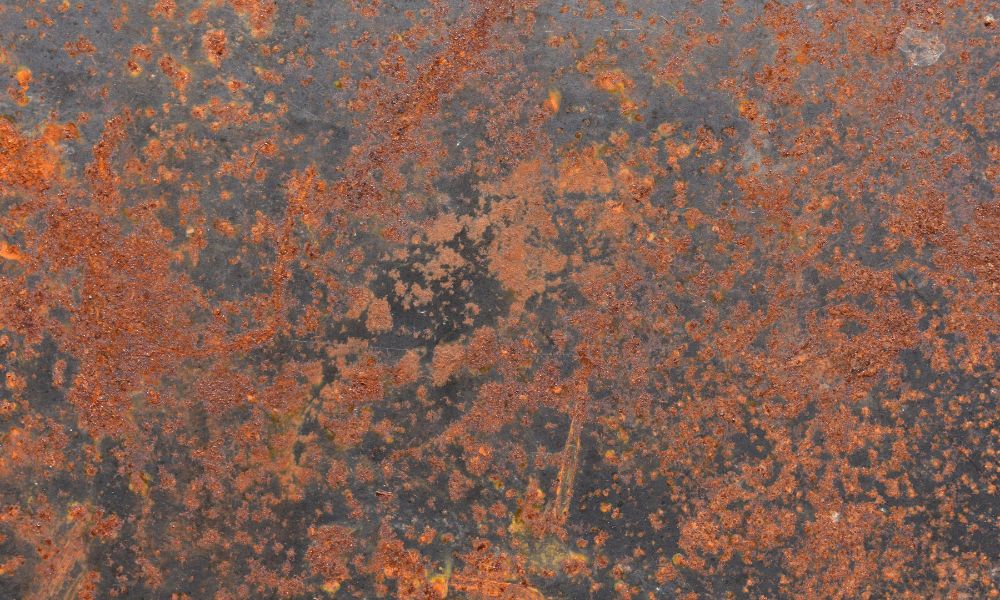
That’s why professional chefs leave no stone unturned in keeping their griddles in top-notch condition.
Here’s a classic example from my personal chapter. One summer, my backyard barbecue session ended with my Blackstone griddle sporting a coat of rust.
How? Simple.
Covering the griddle with a damp cloth after cooking led to rust. The moisture-filled fabric reacted with the griddle’s iron metal, causing a rust outbreak on its surface. This experience was a harsh reminder that moisture and griddles don’t mix well.
By understanding the bond between moisture and your griddle, you can preclude future rust buildup, ensure the longevity of your cherished Blackstone griddle, and, most importantly, fortify your health.
The Tricky Dynamics of Rust Formation
| Factors Aiding Rust Formation | Resultant Consequences |
|---|---|
| Presence of Iron in the griddle’s metal | Base for rust formation |
| Reaction of Iron with Oxygen & Moisture | Rust Formation |
| Neglected rust on the griddle’s surface | Alters griddle’s texture affects food’s flavor |
| Regular cooking on a rusty griddle surface | Possible health risks |
Keep these insights in mind to proactively prevent rust from messing up your yummy cooking sessions on your favorite Blackstone griddle!
Safety Precautions
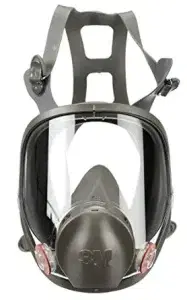
Before diving into the details, let’s embrace the golden rule – safety first. Cleaning a rusted griddle can pose a few risks, especially if you need to follow the necessary safety measures.
This guide will acquaint you with these safety procedures to ensure a risk-free and efficient cleaning session.
The basics begin with equipping yourself with the right Personal Protective Equipment (PPE). It might sound clichéd, but this step is often underrated. It goes beyond just sporting a pair of rubber gloves 👀. It’s desirable to wear an apron, safety goggles, and industrial-grade gloves. Additionally, use proper nose and mouth coverage to ward off any rust particle inhalation.
You see, once, during a griddle refurbishing mission, I unexpectedly breathed in rust dust even with a standard dust mask on. That incident taught me that one can never be too cautious. Consequently, a full-face respirator mask became an indispensable part of all my subsequent cleaning endeavors.
Always remember, there’s no harm in adding an extra layer of protection. After all, your goal should be not just to get a sparkly clean griddle but also to complete the process without a scratch on you.
Next, let’s discuss the cleaning process. Rusted griddle cleaning involves using an acidic solution, which can potentially harm your skin and eyes if not dealt with cautiously. Thus, the emphasis on ample PPE 🛡️. The acid can corrode your skin and eyes; hence, ensure you’re fully protected before you kickstart the cleaning.
A crucial step post-cleaning is the application of a protective coating on the griddle to prevent rust from making a comeback. Skipping this might invite more rust, causing an added maintenance burden in the future. Let me assure you, frequent dealing with rust is something you’ll miss.
Lastly, patience is key. Ensure you allocate ample time for the process, conduct it systematically, and prioritize safety over swift completion. Every tiny step counts and any haste might lead to injuries or incomplete cleaning. Drawing from my experiences, I vouch that rushing, even with the best intentions, doesn’t yield satisfactory results.
Wrapping up and adhering to these safety precautions can ensure a smoother and safer griddle cleaning journey. Remember, preparations are as crucial as the cleaning itself. So buckle up, adopt a steady pace, and gift your griddle a new life!
As the saying goes, ‘People first,’ here too, we are putting your safety ahead. Happy cleaning! 🔄
Key Points to Remember for Safe & Effective Griddle Cleaning
| Important Steps | Why is it essential? |
|---|---|
| Correct Personal Protective Equipment (PPE) | Protects from rust dust and harmful cleaning solutions |
| Use of industrial-grade gloves & full-face respirator mask | Additional protection during cleaning |
| Using an acidic solution for cleaning | Effectively removes rust |
| Application of protective coating post-cleaning | Prevents future rust formation |
| Taking adequate time for the process | Ensures thorough cleaning and reduces injury risk |
Always remember these tips for a safe and successful griddle cleaning experience!
Step-By-Step to Remove Rust from Your Blackstone Griddle
With usage and time, your Blackstone griddle may accumulate hardened grime and rust. But don’t stress, as this guide provides the best tried-and-tested method to restore its shine.
Start the rectification procedure to remove rust by heating your griddle on high. This heat treatment will cause the build-up to loosen, making it easier to scrape it off. However, be cautious while maneuvering the hot griddle.
After heating, use a soft cloth or paper towel to wipe down the griddle. Quite often, simple heating can soften the rust particles enough to be wiped away 👍. But if the rust proves stubborn, don’t worry, as the upcoming steps will remove rust from the most rigid surfaces.
The third step involves using a griddle-cleaning brick or, in its absence, a roll of steel wool. Both are highly effective in combating severe build-ups. Illustrating from a personal experience while revamping an old yard-sale griddle, the grunge was so severe that the griddle brick acted as a magic wand, helping me the best way to remove obstinate grime.
Dampen a cloth or paper towel with cooking oil. Then, scour your griddle using the oil-soaked steel wool or griddle brick. The blend of oil and the gentle abrasiveness of steel wool will effectively lift the rust off the griddle surface.
Finally, once your griddle is thoroughly cleaned of rust, it’s critical to season it. The exposed raw cast iron on your griddle can easily rust again if not treated appropriately. A proper seasoning creates a protective layer that blocks future rust formation and keeps your griddle looking new 😎.
There you have it! Your Blackstone griddle should now be rust-free and as good as new. This method is more than just efficient. It also forestalls further griddle damage. Based on my firsthand experience, I found this the best way to remove rust and revive the griddle to its original beauty. So, don’t hesitate to give it a shot when rust spots show up on your griddle.
Steps to Removing Rust from Blackstone Griddle
- Heat the griddle: Turn your Blackstone griddle on high heat to loosen the build-up. 🔥
- Wipe it down: After heating, use a cloth or paper towel to wipe off the griddle. This may remove some rust. 👍
- Scrub with a brick or steel wool: If rust persists, scrub with a griddle-cleaning brick or steel wool. 💪
- Apply cooking oil: Dampen a cloth with oil and scrub the griddle using steel wool or a brick. The oil helps lift rust. 🛠️
- Season the griddle: After cleaning, season your griddle to protect it from future rust. 🍳
- Enjoy your restored griddle: Your Blackstone griddle should now look as good as new. 😎
Take your time clearing the rust from your griddle before the last minute. Always keep it clean and well-maintained to prolong its lifespan.
[su_box title=”📚Fact” style=”default” box_color=”#DC1182″ title_color=”#FFFFFF” radius=”3″]Fact: Mechanical methods of rust removal, like sanding or scrubbing with steel wool, can remove rust but may also scratch the griddle surface.[/su_box]
The Satisfaction of Restoration: Your Griddle, Like New
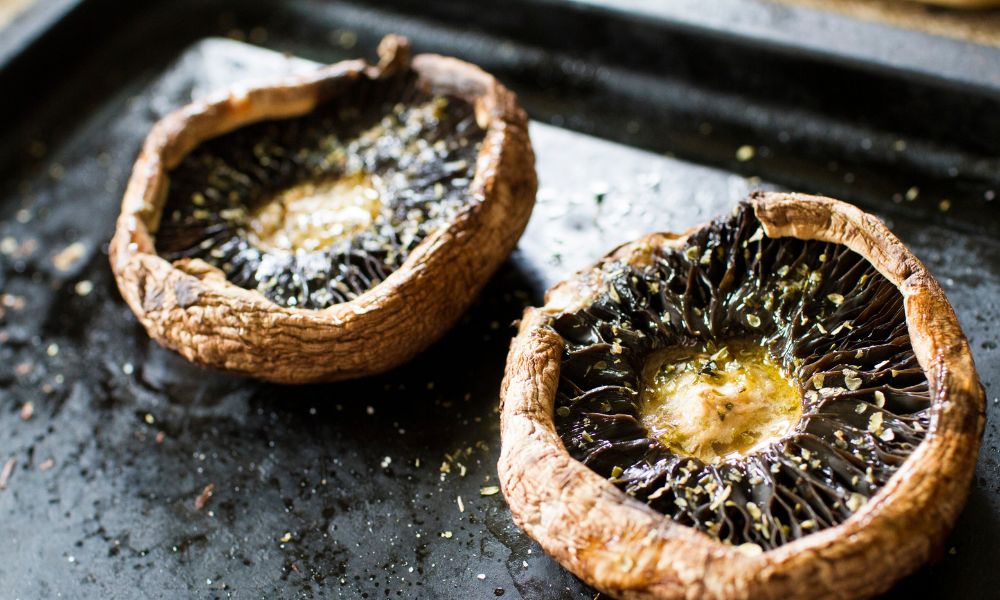
Why buy new when you can restore your Blackstone griddle to its former glory at a fraction of the cost? Restoring your griddle is not just a cost-effective solution; it’s an investment in the longevity of your cooking experience and a testament to your commitment to sustainability. For less than the cost of a new griddle, you can gather the supplies needed and spend an afternoon on restoration. And the satisfaction? Unbeatable.
But don’t just take my word for it. Chefs and home cooks who’ve followed these steps have shared their success:
“I thought my griddle was beyond saving, but with these tips, it looks and cooks like it’s brand new. I saved money and felt great doing it!”
– Alex, Home Cook
“Restoration is the way to go. Not only did I save hundreds of dollars, but the process was also straightforward and the results were amazing.”
– Chef Daniela
As you put away your cleaning supplies and heat your restored griddle for the first time, ready to cook a meal for friends or family, you’ll feel a sense of accomplishment that buying new just can’t match.
So, roll up your sleeves and let the restoration begin!
Innovative Rust Removal Techniques for Griddles
Keeping your griddle rust-free not only extends its lifespan but also enhances the flavor of your food. Traditional methods of rust removal are popular. However, these innovative techniques might also interest you:
Rub a cut lemon with salt on the rusted surface, and watch the rust disappear quickly. 🍋
Non-toxic solvents offer a green alternative for cleaning griddles. 🌱
If you’re looking for eco-friendly solutions, biodegradable rust solvents are excellent. They remove rust without harsh pollutants. Using a potato with dish soap as a scrubber might sound odd, but it effectively removes rust. 🥔✨
Personal-sized laser cleaners are now available on the market. 🔦
Professional methods like chelation and phosphating are impactful for preventing rust. 🛡️
Quick Tips:
Metal restoration professionals usually provide ultrasonic cleaning, but home-based ultrasonic cleaners are available too. 🏠💦
These devices safely and efficiently remove rust, restoring your griddle’s shine. ✨
Lastly, non-toxic rust removal methods, such as a homemade paste from baking soda or white vinegar, are time-tested and effective. Whether you choose high-tech laser cleaning or simple natural remedies, you can find the ideal rust removal solution for your griddle. 🔍👍
| Rust Removal Techniques | Tool/Ingredients Needed | Procedure |
|---|---|---|
| Natural acids | Vinegar, Salt, Baking Soda, Lemons | Rub the natural acid on the rusted surface |
| Biodegradable rust solvents | Rust solvent | Apply the solvent on the rusted area and scrub off the rust |
| Mechanical abrasion | Potato and Dish soap | Rub the soap-coated potato on the rusted griddle |
| Laser Cleaning | Personal-sized laser cleaner | Use the cleaner as per the user manual |
| Phosphating treatment and Chelation Therapy | Professional service | Opt for a professional service |
| Ultrasonic Cleaning | Ultrasonic cleaner | Submerge the griddle in the cleaning solution and use the cleaner as per the user manual |
Keep exploring till you find a rust removal method that best fits your needs and your griddle’s requirements. After all, a well-maintained griddle results in delicious, mouth-watering dishes!
Choosing the Right Oil for Seasoning Blackstone Griddle and Why
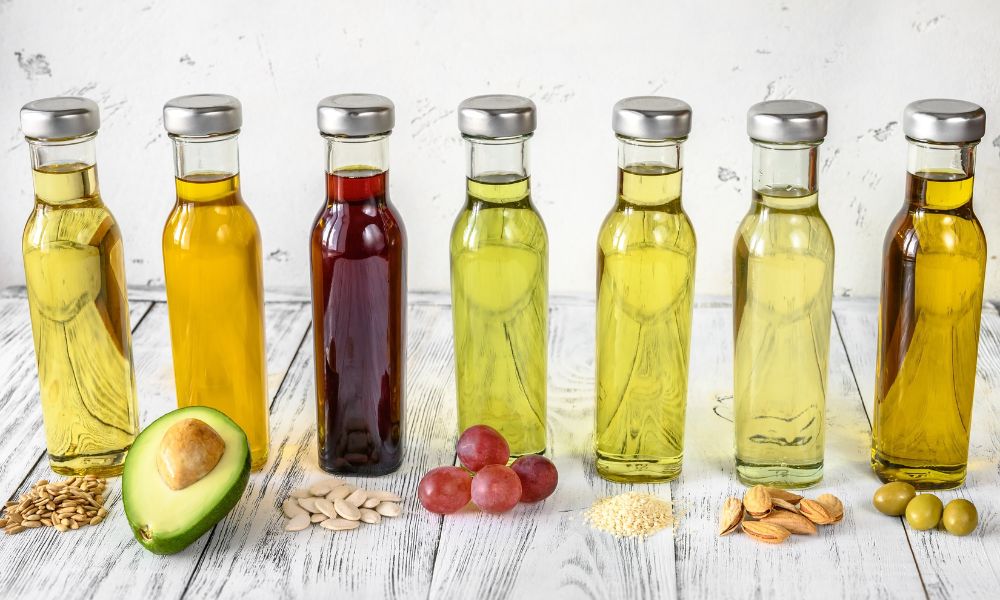
Selection of the Right Cooking Oil is hugely significant when seasoning your griddle, a step paramount to churning out hot, delicious meals. Oil not only influences the health quotient but also the overall taste and texture of your food.
Case in point: Many moons ago, during a bustling Sunday brunch at a familiar eatery, a kitchen staff member confusedly used olive oil instead of the typical canola oil to season the griddle. Though a culinary faux pas, it served as a watershed moment, underlining the importance of oil selection.
Each cooking oil possesses a different heat resistance level, aptly called its smoke point. For the perfect griddle seasoning, an oil with a sufficiently hot smoke point is indispensable – it helps evade burning at high temperatures. Once the oil reaches its smoke point, it disintegrates, discharging free radicals and a substance identified as acrolein, specifically responsible for the harsh flavor in overly cooked oils.
In this context, canola oil often wins people over owing to its high smoke point and neutral flavor that ensures that your food retains its authentic taste. Additionally, for the health-conscious, it offers the benefits of heart-friendly omega-three acids 💓.
Flaxseed oil, another popular choice, lends a sturdy, slick coating ideal for crafting a non-stick layer on your griddle. It’s also revered for its potential beneficial effects on heart health.
Regardless of the oil you pick, remember the target is to boast a well-seasoned griddle. With that in mind, apply a light layer of oil after every griddle cleaning. This practice will aid in maintaining the seasoning and hindering rust formation. So, the next time you light up your Blackstone Griddle, you’ll be ready to dish out a flawless food fiesta.
Choice Of Oils For Seasoning your Blackstone Griddle
| Oil Types | Benefits | Drawbacks |
|---|---|---|
| Canola Oil | High Smoke Point, Neutral Flavor, Contains omega-three acids | Not suitable for people preferring oil-free flavor |
| Flaxseed Oil | Creates Hard Non-Stick Layer, Good for Heart | Might Alter Taste if Applied Heavily |
A well-seasoned griddle not only ramps up your food’s flavor but also extends your griddle’s lifespan.
How to Season Your Blackstone Griddle After Rust Removal
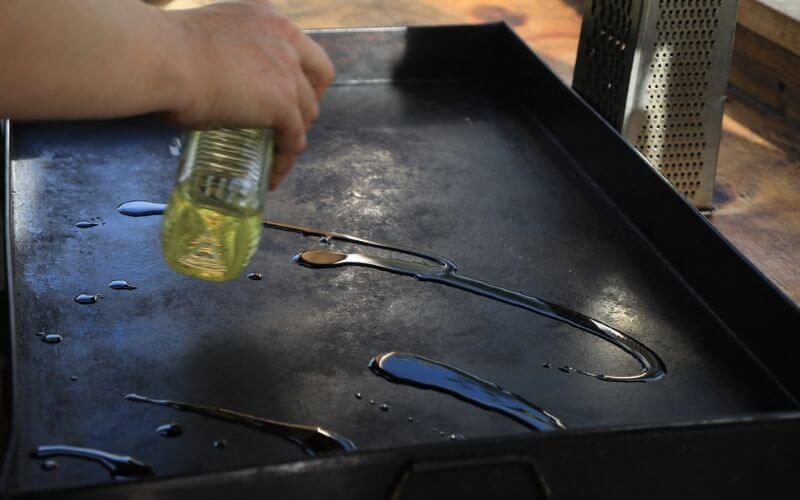
One vital tip for preserving your griddle’s top-notch performance is to season your griddle as often as possible. This is undoubtedly the most critical way to prevent rusting and maintain your grill’s longevity. Through personal experiences, I’ve learned that regular seasoning is the key to sustaining both the non-stick properties and heat retention of the griddle.
Primarily, to season your griddle top, aim to heat it uniformly. This opens the griddle’s pores and allows oil absorption, creating a natural, durable, non-stick surface. Reflecting on my own experiences, this reminded me of revamping an old, rusted grill for a weekend barbecue – heat has always been my trusted ally in such cases.
Notably, not all oils are equal when seasoning your griddle. The most preferable oil for the job is flaxseed, given its low smoke point and ability to create a robust seasoning layer. However, should flaxseed not be readily available, canola or vegetable oil are suitable alternatives. A fascinating point to ponder is that different oils can slightly alter the taste of your food cooked on the seasoned griddle surface.
As the griddle heats evenly, spread a thin, uniform layer of oil across the top. You can use a paper towel for this. Based on my grilling sessions, I’ve observed that a well-heated and uniformly oiled griddle does magic in every cooking session.
The next step is letting the oil smoke off. This ‘burning in’ procedure is instrumental in preventing rust and eliminating unwanted flavors from your oil. Do note once the smoking halts, your first round of seasoning is complete. Now, you must optimally repeat this process around four times for the best outcomes.
Seasoning your griddle is the heartbeat of maintaining a healthy, rust-free grill. It’s a culinary secret that I’ve implemented in my kitchen, transforming the taste and quality of my food. So, embrace the notion of frequent seasoning – turn up the heat, oil your griddle top, and guarantee your grill withstands the march of time.
A Comprehensive Guide to Seasoning Your Griddle After Rust Removal
| Step | Procedure | Reason |
| Step 1 | Heat the griddle evenly | Opens the griddle’s pores and prepares it for seasoning |
| Step 2 | Spread a thin layer of oil across the griddle top | Forms the initial layer for seasoning |
| Step 3 | Let the oil smoke off (process of ‘burning in’) | Helps prevent rust and unwanted flavors |
| Step 4 | Repeat the process up to four times | Creates a robust, long-lasting seasoning layer |
Remember to season your griddle regularly as it not only prevents rust but also enhances the taste of your food.
Eco-Friendly Over Chemicals: A Rust Removal Comparison
It’s easy to reach for powerful chemicals to remove rust, but these can harm the environment and your health. Using heat, lemon juice, or vinegar, you’re choosing methods that are just as effective without the negative impact.
Here’s a quick comparison to show you the benefits:
| Method | Efficacy | Environmental Impact | Health Safety |
|---|---|---|---|
| Chemical Cleaners | High | Negative | Risky |
| Lemon Juice & Vinegar | Moderate | Minimal | Safe |
| Heat Treatment | Moderate | Minimal | Safe |
By opting for these eco-friendly techniques, you’re not only preserving your griddle but also protecting your health and the planet.
Health Benefits of Cooking on a Well-Maintained Griddle
A clean griddle is a joy to cook on and essential for healthy cooking. Keeping your Blackstone griddle rust-free and well-seasoned ensures your food has no contaminants.
Rust may change the taste and color of your meals and pose health risks with frequent ingestion. Choose eco-friendly cleaning methods and safe, food-grade oils like flaxseed or high smoke point oils. This protects your health and improves your food’s flavor.
Environmental Impact of the Rust Removal Process
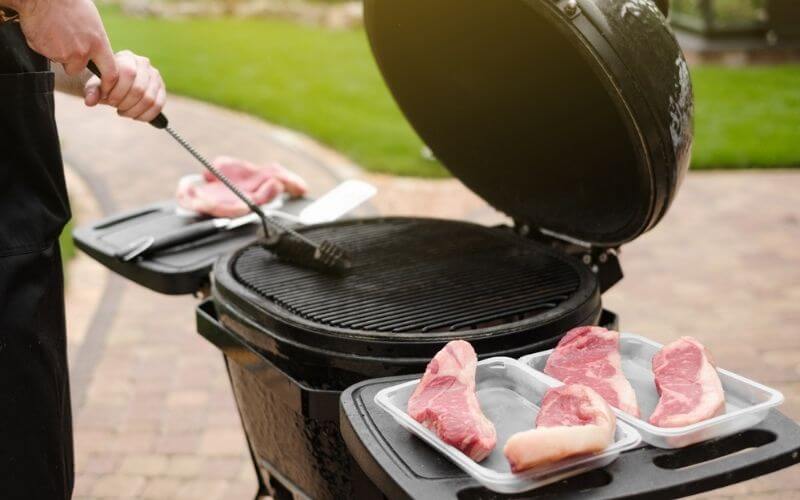
Outdoor maintenance often includes removing rust from our equipment. It’s crucial to be aware of how our actions affect the environment.
Consider a common grill stone, for instance, which can become rusty. The usual response might be to use strong chemicals for quick cleaning. However, these chemicals can harm the environment when washed away, entering our water systems and harming aquatic life, polluting our natural water resources.
But I have good news 😇. You don’t have to risk the planet’s health for cleanliness. There’s a better way – eco-friendly methods that clean effectively while protecting the environment.
One such method is using heat to remove rust. You just apply heat to the rusted item, and the rust flakes off after cooling. This method is environmentally safe, but you must dispose of the rust flakes properly.
Correct disposal of rust is critical for the environment. Rust doesn’t break down in nature and can add iron oxide to the soil, which disrupts local ecosystems. Environmental agencies advise collecting rust in a sealed bag and disposing of it at a waste facility.
You can replace industrial cleaners with natural acids like lemon juice and vinegar. These substances break down rust safely for the environment. Always choose environmentally friendly options to protect our planet’s future.
Knowing how our rust removal affects the environment shows our responsibility to the Earth. With the right knowledge and commitment, we can protect our environment and keep our equipment in great shape.
Eco-friendly Rust Removal Techniques
| Techniques | Benefits |
|---|---|
| Using heat | No harmful byproducts, easy to remove rust |
| Collecting and properly disposing of rust particles | Prevents soil contamination |
| Using lemon juice and vinegar for cleaning | Breaks down rust safely |
Every initiative counts, so let’s play our part in preserving the environment. Use eco-friendly methods for rust removal — a step closer to a green world!
More than Cooking: A Gathering Place
The sizzle of pancakes on a Sunday morning is special, with the family gathered around for the first tasty bite. We cherish these moments of shared laughter and storytelling around a hot griddle.
A well-kept griddle is more than a tool; it’s central to the kitchen, making memories and passing down traditions.
❤️ Keep your Blackstone griddle free of rust to maintain uninterrupted moments, protect the taste of your food, and keep loved ones healthy.
As we discuss maintenance details, remember it’s not only about preserving a cooking surface. It’s about caring for the place where we celebrate life with our meals.
FAQs
What causes my Blackstone griddle to rust?
Rust forms when the iron in your griddle reacts with oxygen and moisture. It’s a common issue that can affect the flavor of your food and, over time, may pose health risks.
Can I still cook on a rusty Blackstone griddle?
Rust forms when the iron in your griddle reacts with oxygen and moisture. It’s a common issue that can affect the flavor of your food and, over time, may pose health risks.
How can I prevent my griddle from rusting?
Regular maintenance, including keeping the griddle dry, storing it properly, and routine seasoning with high smoke point oils, can help prevent rust. Avoid leaving it exposed to the elements and wipe it down after use.
What are some safe methods to remove rust from my griddle?
Eco-friendly techniques like heating the griddle to loosen rust, using natural acids like vinegar and lemon juice, or mechanical methods like scrubbing with a potato and dish soap are effective and safe for the environment.
Is it necessary to season my griddle after rust removal?
Yes, seasoning your griddle after rust removal is crucial. It creates a protective layer that prevents future rusting and enhances your griddle’s non-stick properties.
What are the best oils to use for seasoning my Blackstone griddle?
Flaxseed oil and canola oil are great options due to their high smoke points and health benefits. Flaxseed oil creates a durable, non-stick layer, while canola oil is neutral in flavor and high in omega-three acids.
Conclusion
As we conclude our rust-removal journey, remember that your Blackstone griddle is more than a cooking surface; it’s the centerpiece of your outdoor kitchen. Keeping it rust-free protects it from the weather, making sure each meal is wonderfully flavorful.
🌟 Regular maintenance may seem tedious, but it’s the key to your griddle’s long life and the great taste of your food.
🍳 Whether you’ve tackled rust with lemon juice or surprisingly used a potato, every cleaning effort makes you more in control of your griddle’s condition.
👑 And remember, properly seasoning your griddle sets you up for many mornings of perfect pancakes and delicious steaks. 🥞🥩
So, put on your apron with pride and realize that with every flip and sizzle, you’re creating lasting memories on a griddle as perfect as your cooking dreams. ❤️